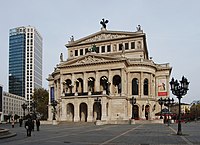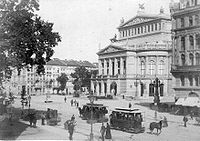Alte Oper
- 20 October 1880; 143 years ago (1880-10-20)
- 28 August 1981; 42 years ago (1981-08-28)
- 2,500 (Großer Saal)
- 700 (Mozart-Saal)

 Alte Oper
Alte Oper






 Taunusanlage
Taunusanlage 64 Alte Oper
64 Alte Oper
Alte Oper (Old Opera) is a concert hall in Frankfurt am Main, Hesse, Germany. It is located in the inner city, Innenstadt, within the banking district Bankenviertel. Today's Alte Oper was built in 1880 as the city's opera house, which was destroyed by bombs in 1944. It was rebuilt in the 1970s as a concert hall with a large hall and smaller venues, opened in 1981. The square in front of the building is still known as Opernplatz (Opera Square).
Many important works were performed for the first time when it was Frankfurt's opera house, including Schreker's Der ferne Klang and Carl Orff's Carmina Burana in 1937. The Oper Frankfurt now plays in the Opern- und Schauspielhaus Frankfurt, completed in 1951.
Historic opera house
The building was designed by the Berlin architect Richard Lucae, financed by the citizens of Frankfurt and built by Philipp Holzmann. Construction began in 1873.[6] It opened on 20 October 1880. Among the guests was Kaiser Wilhelm I of Germany, who was impressed and said: Das könnte ich mir in Berlin nicht erlauben. (I couldn't permit myself this sort of thing in Berlin.)[7]
The costs increased from the originally planned 2 million marks to a multiple.[8] Alluding to the inscription on the frieze
- "Dem Wahren, Schönen, Guten", ("To the true, the beautiful, the good")
the folkloristic Frankfurt poet Adolf Stoltze [de] wrote, in his best Hessian dialect:
- Dem Wahre, Scheene, Gute, die Berjerschaft muß blude. (To the true, the beautiful, the good, the citizens must bleed.)[9]
Concert Hall
The opera house was extensively damaged by bombing raids during World War II in 1944, though many of the outside walls and façades survived. In the 1960s the city magistrate planned to build a modern office building on the site. The then Minister of Economy in Hessen Rudi Arndt, earned the nickname "Dynamit-Rudi" (Dynamite Rudi) when he proposed to blow up "Germany's most beautiful ruin" with "a little dynamite".[10] Arndt later saved the Alte Oper.[11]
A citizen's initiative campaigned for reconstruction funds after 1953 and collected 15 million DM. It ended costing c. 160 million DM, and the building was reopened on 28 August 1981 to the sounds of Gustav Mahler's Symphony No. 8, the "Symphony of a Thousand".[12][4] A live recording of that concert conducted by Michael Gielen is available on CD.[13][14]
Alte Oper has venues of different size:
- Großer Saal (Large Hall) with 2500 seats
- Mozart-Saal, 700 seats
- and smaller halls for conventions.
Gallery
-
 Front
Front - Eastern facade in September 2014
-
 Alte Oper at night
Alte Oper at night -
 Frankfurt opera house, c. 1880
Frankfurt opera house, c. 1880
References
Notes
- ^ Klein, Michael; Gerlinger, Lutz. "Objekte L". kunst-im-oeffentlichen-raum-frankfurt.de (in German). Retrieved 17 December 2022.
- ^ "Deutschlands schönste Ruine". Süddeutsche.de (in German). 28 August 2011. Retrieved 17 December 2022.
- ^ "Alte Oper". frankfurt.de (in German). Retrieved 17 December 2022.
- ^ a b "Daten · Fakten · Hintergründe : Erweiterte Suche : LAGIS Hessen". Zeitgeschichte in Hessen (in German). Retrieved 14 August 2022.
- ^ Hartmann, Andreas (23 August 2021). "Überall funkelte es golden". Frankfurter Rundschau (in German). Retrieved 17 December 2022.
- ^ Groß, p. 50
- ^ "Chronik und Historie". www.alteoper.de (in German). Alte Oper Frankfurt Konzert- und Kongresszentrum GmbH. 21 December 2009. Archived from the original on 22 February 2014. Retrieved 5 February 2014.
- ^ "Alte Oper". Frankfurt-Lese (in German). 3 April 2017. Retrieved 14 August 2022.
- ^ Helmensdorfer, Erich (1982). Frankfurt – Metropole am Main: Geschichte und Zukunft (in German). Düsseldorf, Vienna: Econ-Verlag. p. 234. ISBN 978-3-430-14261-8.
- ^ Gantevoort, Joy (22 January 2018). "Wie die Frankfurter Oper fast gesprengt wurde: "Nur ein bisschen Dynamit"". fnp.de (in German). Retrieved 14 August 2022.
- ^ Michels, Claudia (29 October 2011). "Er war Dynamit". Frankfurter Rundschau (in German). Retrieved 14 August 2022.
- ^ "Eröffnungskonzert". Alte Oper Frankfurt (in German). Retrieved 14 August 2022.
- ^ Symphony no. 8 "Symphony of a thousand"; "Symphonie der Tausend", Sony, 1992, OCLC 916400443
- ^ Symphonie no. 8 Symphonie der Tausend; Live-Mitschnitt d. Konzerts zur Wiedereröffnung d. Alten Oper Frankfurt vom 28. August 1981 (in German), 1981, OCLC 725794459
Sources
- Groß, Lothar (2012). Made in Germany: Deutschlands Wirtschaftsgeschichte von der Industralisierung bis heute Band 1: 1800 – 1945. Books on demand. ISBN 978-3-8482-1042-8.
External links

- Alte Oper Frankfurt (in German)
- Welcome to Oper Frankfurt
- Stadt-Panorama Alte Oper – Interactive 360 degree panorama with day and night views (in German)
- A view on cities
- Philharmonia.co.uk
- v
- t
- e
- Waldbühne
- Kindl-Bühne Wuhlheide
- Uber Arena
- Max-Schmeling-Halle
- Velodrom
- Treptow Arena
- Konzerthaus Berlin
- Tempodrom
- ICC Berlin
- Berliner Philharmonie
- Huxley's Neue Welt
- Køpi
- A-Trane
- B-flat
- SO36
- Olympiahalle
- Rudi-Sedlmayer-Halle
- Gasteig
- Zenith
- Alabama-Halle (former)
- Lanxess Arena
- Kölner Philharmonie
- Live Music Hall
- Gloria-Theater
- Bad Segeberg
- Kalkberg Stadium
- Bochum
- Anneliese Brost Musikforum Ruhr
- Bonn
- Beethovenhalle
- Bremen
- Die Glocke
- Dortmund
- Westfalenhalle
- Dresden
- Kulturpalast
- Düsseldorf
- Tonhalle Düsseldorf
- ISS Dome
- Mitsubishi Electric Halle
- Duisburg
- Landschaftspark Duisburg-Nord
- Erfurt
- Messe Erfurt
- Essen
- Grugahalle
- Saalbau Essen
- Zeche Carl
- Frankfurt am Main
- Alte Oper
- Batschkapp
- Festhalle Frankfurt
- Jahrhunderthalle
- HR Sendesaal
- Hanover
- Eilenriedehalle
- Landesfunkhaus
- Niedersachsenhalle
- Music Hall (closed)
- Stadthalle Hannover
- ZAG-Arena
- Leipzig
- Arena Leipzig
- Gewandhaus
- Conne Island
- Haus Auensee
- Arena Ludwigsburg
- Mannheim
- SAP Arena
- Münster
- Halle Münsterland
- Nürnberg
- Arena Nürnberger Versicherung
- Oberhausen
- Rudolf Weber-Arena
- Turbinenhalle
- Offenbach
- Stadthalle
- Sankt Goarshausen
- Freilichtbühne Loreley
- Stuttgart
- Porsche-Arena
- Hanns-Martin-Schleyer-Halle
- Twist
- Heimathaus Twist
- Viersen
- Festhalle Viersen
- Wiesbaden
- Schlachthof
- Kurhaus
- Active
- Bang Your Head!!! (Balingen)
- Bayreuth Festival (Bayreuth)
- Dong Open Air (Neukirchen-Vluyn)
- Euroblast Festival (Cologne)
- Full Force (Lobnitz)
- Internationale Jazzwoche Burghausen (Burghausen)
- Klavier-Festival Ruhr (Ruhr area)
- Ragnarök Festival (Lichtenfels)
- Rock am Ring (Nürburgring)
- Rock Hard Festival (Gelsenkirchen)
- Rock im Park (Nuremberg)
- Summer Breeze Open Air (Dinkelsbühl)
- Wacken Open Air (Wacken)
- Former
- Monsters of Rock (various; Last festival - 2006)



























